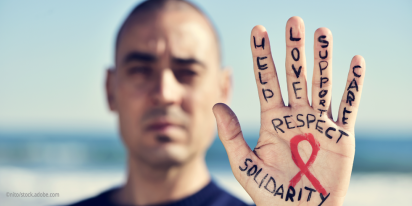That is discrimination

Discrimination is the unequal treatment of people depending on which group they belong to. For example, people with HIV, people with headscarves and people with disabilities experience discrimination in Germany. This happens through disadvantage, marginalisation and insults. Discrimination restricts people's rights and denies them equality.
It is not always easy to recognise whether someone is being discriminated against in relation to HIV or, for example, in a homophobic, racist or anti-disability way, as the forms can overlap. Sometimes several forms of discrimination can occur at the same time.
- Discrimination in accordance with the General Equal Treatment Act (AGG)
Since 2006, the General Equal Treatment Act (AGG), often referred to as the Anti-Discrimination Act, has provided legal protection against discrimination. The aim of the AGG is to prevent discrimination on the grounds of
- ethnic origin or racist attributions,
- gender,
- religion or belief,
- disability,
- age,
- sexual identity.
In addition to the focus on the world of work, the AGG also applies to everyday transactions (e.g. shopping, restaurant visits, train and bus journeys), the housing market, education, health and care. Since a verdict by the Federal Labour Court in 2013, people with HIV are also protected by the AGG.
This means that not every discrimination you have experienced is also discrimination in the legal sense. Other characteristics are currently being discussed as worthy of protection, for example "social status", "chronic illness", "body weight" and "gender identity". We are also calling for a reform of the AGG in order to create a stronger and more effective anti-discrimination law.
- Why are people with HIV protected by the AGG
Illnesses are covered by the protection of the AGG "if they are chronic and thus have a long-term impact on the everyday life of the persons concerned and impair their social participation, for example (...) HIV infections." (Source: Federal Anti-Discrimination Agency).
- Counselling on the AGG
The local AGG counselling centres (website only available in German) provide support and advice on legal claims for protection and options for legal proceedings that may arise from the AGG.
- Examples of HIV related discrimination
Discrimination can take place on three levels: the individual, the institutional and the social.
- Individual level: An HIV-positive applicant is not hired because of their infection.
- Institutional level: The hygiene officer of a hospital decides that all HIV-positive patients must use an extra toilet.
- Social level: Women with HIV who have children are labelled as irresponsible.
The three levels cannot always be separated so clearly because discrimination often takes place on several levels. But the categorisation can help when it comes to developing counter-strategies.
Let's take the second example: As a person with HIV, I am told by a nurse that I should use an extra toilet. If I realise that the decision was not made individually, but that such a regulation exists in the hospital, I can address my complaint directly to the hygiene officer. This targeted action will probably achieve more than if I address my complaint to the nurse.
In "What to do against discrimination!" we have summarised various possible courses of action.

Lawyer Jacob Hösl, expert in "HIV and criminal law" (Photo: Aidshilfe Köln)
"On 19 December 2013 in Erfurt, the most significant verdict to date by a federal court in Germany on the topic of "discrimination against people with HIV in working life" was handed down. The Federal Labour Court (6 AZR 190/12) (website only available in German) ruled that, according to the principles of the UN Convention on the Rights of Persons with Disabilities, HIV infection is equivalent to a disability within the meaning of the General Equal Treatment Act (AGG, also known as the Anti-Discrimination Act). Whether and to what extent someone is disabled is therefore determined by the barriers that a person faces from the world around them and that restrict their participation in social life. In the case of HIV, these barriers consist of social avoidance behaviour and irrational disadvantages. With this judgement, the protection of the AGG also applies to people with HIV in the workplace." (Lawyer Jacob Hösl, magazin.hiv 2013, website only available in German)
Good to know
- Not only personal insults, but also generalised devaluations of people with HIV are discriminatory.
- Multiple discrimination often occurs, for example based on sexual identity and origin.
- We support you - regardless of whether the AGG offers protection in your case or not.Item one (only bulleted list items here).
